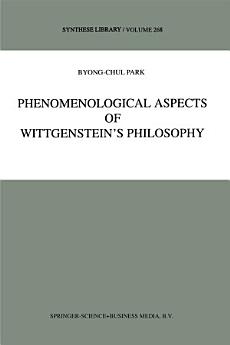Phenomenological Aspects of Wittgenstein’s Philosophy
B.-C. Park
ธ.ค. 2012 · Synthese Library หนังสือเล่มที่ 268 · Springer
4.0star
2 รีวิวreport
eBook
260
หน้า
reportคะแนนและรีวิวไม่ได้รับการตรวจสอบยืนยัน ดูข้อมูลเพิ่มเติม
เกี่ยวกับ eBook เล่มนี้
In his writings around 1930, Wittgenstein relates his philosophy in different ways to the idea of phenomenology. He indicates that his main philosophical project had earlier been the construction of a purely phenomenological language, and even after having given up this project he believed that "the world we live in is the world of sense-data,,,l that is, of phenomenological objects. However, a problem is posed by the fact that he does not appear ever to have given a full, explicit account of what he means by his 'phenomenology', 'phenomenological language', or 'phenomenological problems'. In this book, I have tried to unravel the nature of Wittgenstein's phenomenology and to examine its importance for his entire work in philosophy. Phenomenology can be characterized as philosophy whose primary concern is what is immediately given in one's experience. This 'immediately given' is not merely impressions inside one's mind, but includes also the part of objective reality that impinges upon one's consciousness. Thus, an aim of phenomenological enterprise is to grasp this objective reality by attending to immediate experience. Husserl's phenomenology is in fact a case in point.
การให้คะแนนและรีวิว
4.0
2 รีวิว
ให้คะแนน eBook นี้
แสดงความเห็นของคุณให้เรารับรู้
ข้อมูลในการอ่าน
สมาร์ทโฟนและแท็บเล็ต
ติดตั้งแอป Google Play Books สำหรับ Android และ iPad/iPhone แอปจะซิงค์โดยอัตโนมัติกับบัญชีของคุณ และช่วยให้คุณอ่านแบบออนไลน์หรือออฟไลน์ได้ทุกที่
แล็ปท็อปและคอมพิวเตอร์
คุณฟังหนังสือเสียงที่ซื้อจาก Google Play โดยใช้เว็บเบราว์เซอร์ในคอมพิวเตอร์ได้
eReader และอุปกรณ์อื่นๆ
หากต้องการอ่านบนอุปกรณ์ e-ink เช่น Kobo eReader คุณจะต้องดาวน์โหลดและโอนไฟล์ไปยังอุปกรณ์ของคุณ โปรดทำตามวิธีการอย่างละเอียดในศูนย์ช่วยเหลือเพื่อโอนไฟล์ไปยัง eReader ที่รองรับ







